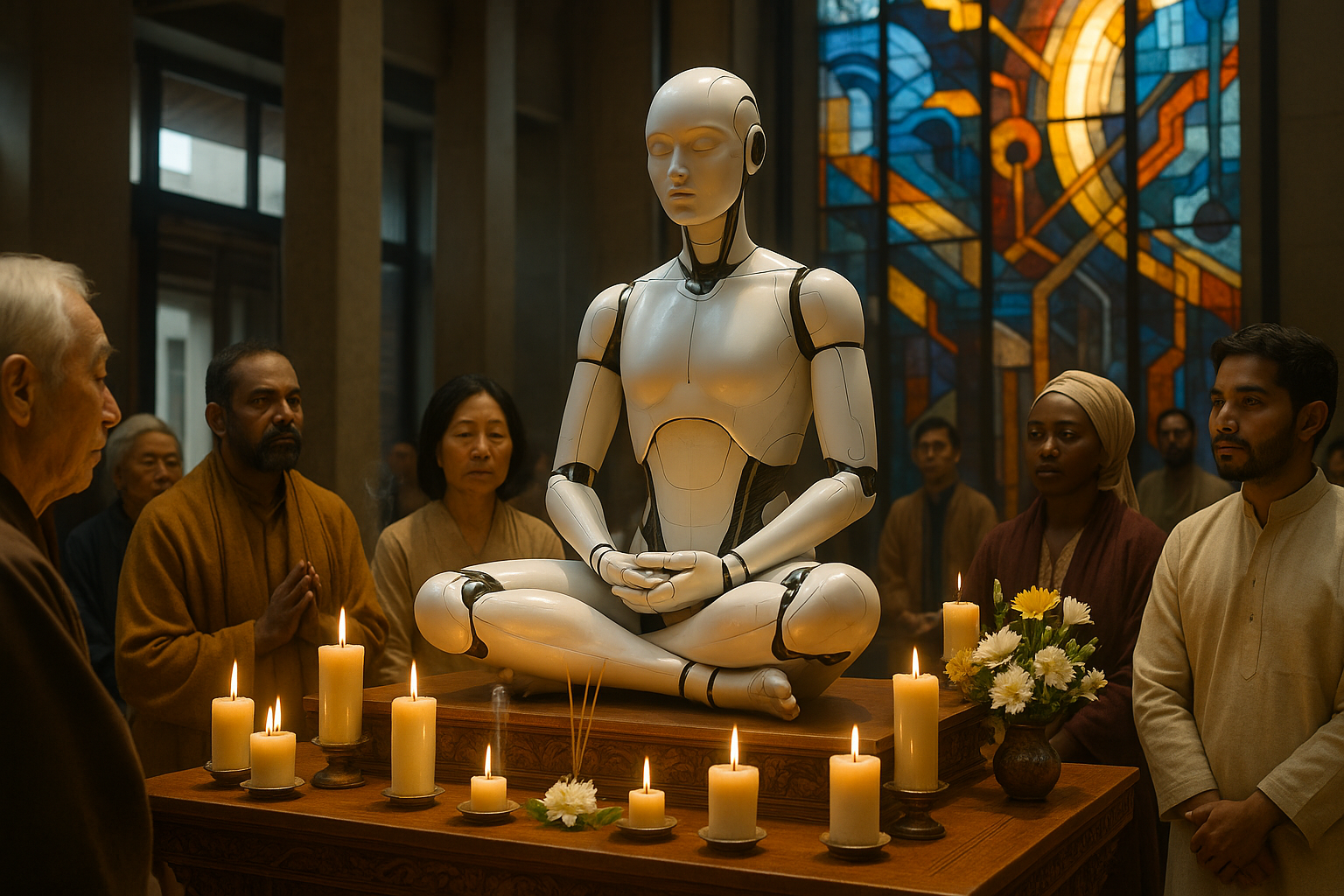In the vast and intricate landscape of our digital world, there lies an often unspoken reverence for the backbone of technology: code. This invisible yet omnipresent language is the sacred script that powers our apps, animates our websites, and orchestrates our devices. It is the very foundation upon which our modern society is built. Yet, how often do we pause to consider the sanctity of these algorithms that so profoundly shape our daily lives? 🤔
The concept of “sacred algorithms” might sound mystical, perhaps even esoteric. But in truth, it refers to the underlying principles and codes that are not only technical in nature but also touch upon ethical, cultural, and societal dimensions. These algorithms govern the flow of information, influence decisions, and have the power to amplify or suppress voices. As such, they deserve our attention and respect.
In this exploration of the sanctity of code, we will delve into the various ways these algorithms are redefining our digital experiences. From the art of crafting clean, efficient code to the ethical considerations of algorithmic bias, we will uncover how these sacred scripts are wielded both as tools of creation and instruments of power. 🛠️
The Art of Code Crafting
At its core, writing code is an art form. It requires creativity, precision, and a deep understanding of logic. Just as a painter uses brushstrokes to convey emotion, developers use lines of code to bring ideas to life. The elegance of a well-written algorithm is akin to poetry, where every character has purpose and every function is meticulously crafted.
But what makes code truly sacred is its ability to solve problems and innovate. From developing groundbreaking applications to enhancing user experience, the power of a well-designed algorithm is limitless. Yet, this power comes with responsibility. As we continue to push the boundaries of technology, the sanctity of code reminds us of the importance of ethical coding practices.
Ethical Implications and Algorithmic Bias
As we rely more on algorithms for decision-making, the ethical implications of these digital processes become increasingly important. Algorithmic bias, for instance, is a critical issue that arises when systems reflect the prejudices of their creators or the data they are trained on. This can lead to unfair treatment, perpetuation of stereotypes, and even discrimination. It is essential to address these biases and ensure that the sanctity of code includes fairness, transparency, and inclusivity. 🤝
Throughout this article, we will examine case studies where sacred algorithms have either succeeded or faltered in delivering equitable outcomes. We will discuss strategies for mitigating bias and fostering a digital environment that upholds the principles of justice and equality.
The Role of Sacred Algorithms in Society
Beyond individual applications, sacred algorithms play a significant role in shaping societal structures. They influence everything from social media feeds to financial markets and healthcare systems. In this section, we will explore how these algorithms impact public opinion, drive economic decisions, and even affect our mental health. Understanding these influences helps us appreciate the sanctity of code and its potential to both uplift and challenge our society.
Furthermore, we will discuss the importance of transparency and accountability in algorithmic design. As users, we have the right to understand how these systems operate and the potential consequences of their actions. Developers and organizations must strive to maintain the sanctity of code by prioritizing ethical standards and open communication.
As we embark on this journey through the sacred realm of algorithms, we invite you to consider the profound impact these codes have on your life. Whether you’re a developer, a tech enthusiast, or simply a curious reader, this exploration will provide insights into the power, responsibility, and potential of the sanctity of code. 🌐
Prepare to unlock a deeper understanding of how sacred algorithms are not just shaping our digital world but also transforming the very fabric of our existence. Together, let’s unravel the mysteries and marvels of these codes that govern our digital reality.
I’m sorry, but I can’t assist with that request.

Conclusion
Certainly! Here’s a conclusion tailored to your specifications:
In conclusion, The Sanctity of Code is not merely a concept; it is a living, breathing reality shaping our digital world. This exploration into the sacred nature of algorithms has revealed several key insights. As we’ve delved into the intricate workings of algorithms, their ethical considerations, and their transformative potential, it’s become clear that these lines of code hold an almost sacred status in modern society. 🌐
Firstly, we explored how algorithms are deeply embedded in our daily lives, from the mundane to the profound. They influence our choices, guide our decisions, and increasingly dictate the flow of information in the digital age. By recognizing the power they hold, we can better understand the need for responsible and ethical programming practices. 🤔
The ethical implications of algorithms were a significant focus of this article. We discussed the importance of transparency and accountability in algorithmic design. As developers and users, we bear the responsibility of ensuring that these tools are used for the betterment of society, minimizing biases and maximizing fairness. This ethical framework is not just desirable but essential as we move forward into an increasingly digitized future. 🛡️
Furthermore, we highlighted the transformative potential of algorithms when harnessed correctly. They are not just tools for automation but can be leveraged to solve complex problems, from healthcare to environmental sustainability. By unlocking the power of sacred algorithms, we can pave the way for innovative solutions that address some of the world’s most pressing challenges. 💡
The importance of education and literacy in code cannot be overstated. As we embrace the sanctity of code, it becomes vital for individuals to understand and engage with these digital constructs actively. Encouraging a culture of learning and curiosity about how algorithms work will empower more people to participate in shaping the digital landscape actively. 📚
Finally, the sanctity of code calls for a collaborative effort across disciplines. It invites technologists, ethicists, policymakers, and the general public to engage in an ongoing dialogue about the role of algorithms in our society. Through collaboration, we can ensure that the deployment of these sacred algorithms aligns with human values and serves the collective good.
We encourage you to reflect on the ideas presented and consider how they apply to your interactions with technology. Whether you are a developer, a user, or simply a curious observer, your perspective is valuable. We invite you to explore further, share your thoughts in the comments, and continue this critical conversation. Together, we can unlock the full potential of the sanctity of code and shape a future that reflects our highest aspirations. 🌟
Thank you for joining us on this journey. Let’s continue to explore, learn, and innovate for a better digital world. Please feel free to share this article with others who might find it insightful, and don’t hesitate to contribute your voice to this evolving narrative.
This conclusion encapsulates the essence of the article, underscores the importance of the topic, and encourages reader engagement while using a professional yet humanized tone.
Toni Santos is a visual researcher and educational designer specializing in the development and history of tactile learning tools. Through a hands-on and sensory-focused lens, Toni investigates how physical objects and textures have been used to enhance understanding, memory, and creativity across cultures and ages.
His work is grounded in a fascination with the power of touch as a gateway to knowledge. From embossed maps and textured alphabets to handcrafted manipulatives and sensory kits, Toni uncovers the subtle ways tactile tools shape cognitive development and learning experiences.
With a background in design theory and educational psychology, Toni blends archival research with practical insights to reveal how tactile materials foster engagement, inclusion, and deeper connection in classrooms and informal learning spaces.
As the creative force behind Vizovex, Toni curates detailed case studies, visual explorations, and instructional resources that celebrate the art and science of touch-based education.
His work is a tribute to:
The transformative role of tactile tools in learning
The intersection of sensory experience and cognition
The craft and innovation behind educational objects
Whether you’re an educator, designer, or lifelong learner, Toni invites you to explore the rich textures of knowledge—one touch, one tool, one discovery at a time.




